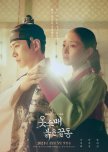Deze recentie kan spoilers bevatten
Romance Based in Historical Realism or Road to Nowhere?
I went into The Red Sleeve fully expecting to love it. I'd been waiting for Lee Jun Ho to be widely recognized as a phenomenal actor since Just Between Lovers, so I was happy to see the praise he received for his performance here. I'm a fan of sagueks too, whether they're the traditional kind or not, and I'm always down to watch an angsty romance between tragic-faced lovers. In a fit of drama-watching naivete, I thought, what could possibly go wrong?
And, in the beginning, nothing did!
Lee Jun Ho brought his usual intensity and attention to detail, to say nothing of his aesthetics. Lee Se Young is convincing in any historical role, since she genuinely looks as if she's stepped out of a portrait from the past, while her poise and graceful bearing reinforce the ladylike impression. The supporting cast is similarly strong, the production quality was high, and the introductory episodes felt refreshingly grounded and realistic.
As the story progresses, real cracks emerged. The first issue is how self-aware this show is of itself as a "feminist" narrative, which would've been fine, if that theme had been handled with care and nuance. But it isn't. To boost its girl power credentials, it introduces a secret organization of female palace insiders, but almost immediately undoes its empowered message, by depicting the network as poorly led and one-dimensional in its villainy. Rather than showing women band together for a just cause, it pits the women against the (morally pure, more sympathetic) female lead. To add insult to injury, this outlandish women-fighting-women chapter is distracting and jarring against the tone of the rest of the drama, which had been, up until this point, based in historical realism.
But the biggest problem? The Red Sleeve chases two rabbits, catching neither. All along, the narrative has brought out wonderful tension in the juxtaposition between Sung Deok Im's quest for self-determining independence and her love for Yi San/King Jeongji, which would lead to her dependence on him, as well as strict confinement to the inner palace. The show insists, she must make a choice! [Please don't get me started on how clearly this mirrors the redundant dialogue around women having to choose between career achievement or motherhood. It's so tired, ugh.] By forcing its female lead to choose freedom or love, it also forces itself into a corner: will the story's conclusion confirm Sung Deok Im's self-liberation or her devotion to her lover? In the end, the answer is neither. If the point of this drama was to illustrate how terrible women's lives were in the past, I supposed it achieved its goal, but that's a disappointingly simplistic take on the historic experiences of real women, as well as a frustrating and futile endpoint for a drama that promised to be so much more.
And, in the beginning, nothing did!
Lee Jun Ho brought his usual intensity and attention to detail, to say nothing of his aesthetics. Lee Se Young is convincing in any historical role, since she genuinely looks as if she's stepped out of a portrait from the past, while her poise and graceful bearing reinforce the ladylike impression. The supporting cast is similarly strong, the production quality was high, and the introductory episodes felt refreshingly grounded and realistic.
As the story progresses, real cracks emerged. The first issue is how self-aware this show is of itself as a "feminist" narrative, which would've been fine, if that theme had been handled with care and nuance. But it isn't. To boost its girl power credentials, it introduces a secret organization of female palace insiders, but almost immediately undoes its empowered message, by depicting the network as poorly led and one-dimensional in its villainy. Rather than showing women band together for a just cause, it pits the women against the (morally pure, more sympathetic) female lead. To add insult to injury, this outlandish women-fighting-women chapter is distracting and jarring against the tone of the rest of the drama, which had been, up until this point, based in historical realism.
But the biggest problem? The Red Sleeve chases two rabbits, catching neither. All along, the narrative has brought out wonderful tension in the juxtaposition between Sung Deok Im's quest for self-determining independence and her love for Yi San/King Jeongji, which would lead to her dependence on him, as well as strict confinement to the inner palace. The show insists, she must make a choice! [Please don't get me started on how clearly this mirrors the redundant dialogue around women having to choose between career achievement or motherhood. It's so tired, ugh.] By forcing its female lead to choose freedom or love, it also forces itself into a corner: will the story's conclusion confirm Sung Deok Im's self-liberation or her devotion to her lover? In the end, the answer is neither. If the point of this drama was to illustrate how terrible women's lives were in the past, I supposed it achieved its goal, but that's a disappointingly simplistic take on the historic experiences of real women, as well as a frustrating and futile endpoint for a drama that promised to be so much more.
Vond je deze recentie nuttig?










